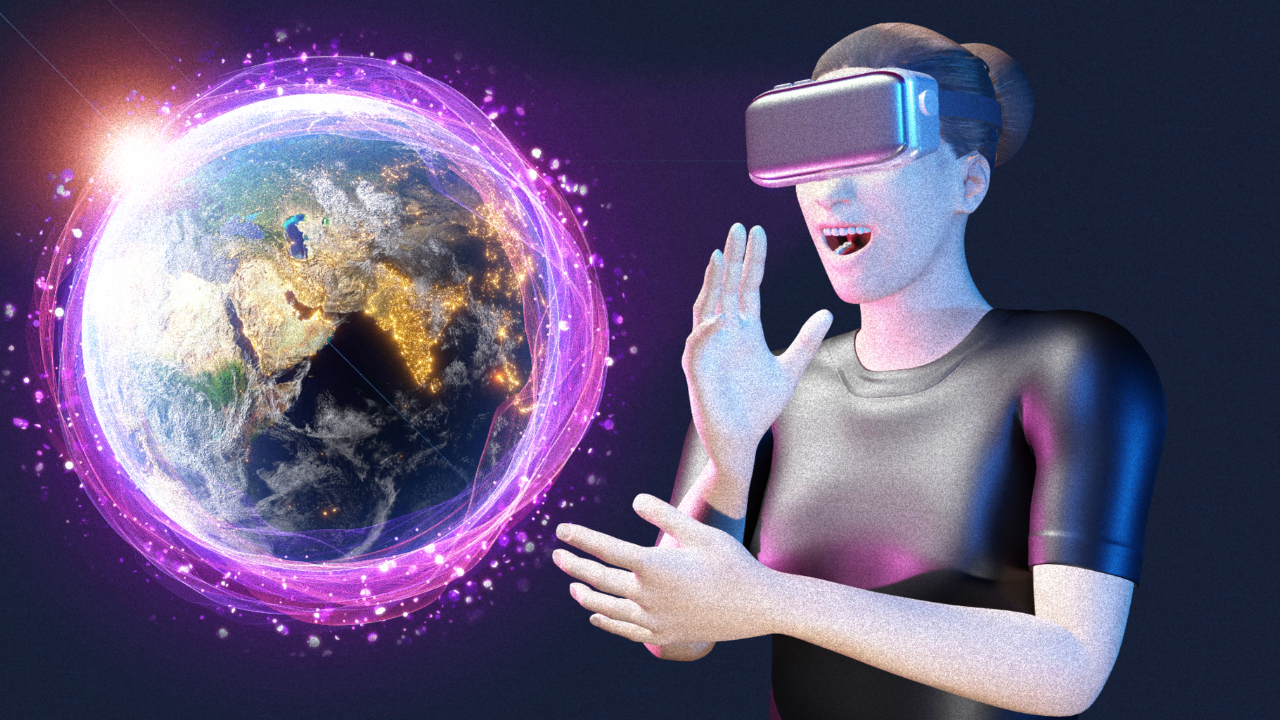Remember "the metaverse"? Long before chatGPT and generative AI dominated tech conversations, it was all anyone could talk about.
Back in 2021, the Metaverse was considered the future of tech– a massive virtual universe where we'd work, play, and socialize across the globe, all through virtual reality.
But somewhere between tech moguls' visions of a new way of life and clunky avatars with no legs, enthusiasm for a new virtual world fizzled out.
In this article we'll explore what happened to the metaverse, delving into why it failed and answer the question: is the metaverse is dead for good?

What is the Metaverse?
The “metaverse” is a virtual space usually accessed through a virtual reality or augmented reality headset where users can game, shop and socialize using avatars. Virtual worlds created by different companies would all be connected into one online universe, or ‘metaverse’.
The term “metaverse” is vague and has been diluted over time. Companies now often refer to individual games or platforms as "a metaverse," encompassing everything from VR concert apps to video games. Epic Games, creator of the game ‘Fortnite’, own ‘metaverse’ features elements that don’t use virtual reality and can be accessed on PCs and game consoles.
Metaverse has become an intentionally vague buzzword allowing companies to exaggerate the scope of their technology.
These extremely loose definitions of a metaverse would encompass experiences that have been available for a long time, such as virtual reality games like ‘VR Chat’ released in 2014 and stretch to include games like Club Penguin, a former online children's game released in 2005 that once supported over 30 million accounts.
In a bold move signalling a major shift in priorities, Mark Zuckerberg, CEO of Facebook, announced a company rebrand to ‘Meta’ in October 2021. Zuckerberg called the metaverse "the next chapter for the internet" in his video announcement of the rebrand highlighting its significance as Meta's "new north star." He further emphasized this shift saying, "we're going to be metaverse first, not Facebook first."
What Happened to the Metaverse?

The metaverse was initially expected to change the way we access the internet and, by extension, the world. But, by 2024, the metaverse bubble seems to have burst.
Companies like Meta poured money into their virtual reality creations like Horizon Worlds, but user engagement failed to meet projections.
By October 2022, Mashable that Horizon Worlds had less than 200,000 users and Business Insider reported that Decentraland, one of the most well-funded Metaverse products, only had around 38 daily active users in its $1.3 billion ecosystem.
The uninspiring realities of the early metaverse products failed to capture imaginations. Investments and public interest quickly jumped ship when the new technological marvel, generative AI, proved more engaging and thus more potentially profitable.
Read: Has ChatGPT Killed Zuck’s Metaverse?
Microsoft, a pioneer in virtual workspaces, has shifted its focus away from metaverse projects. The company is now prioritizing its $11 billion investment in OpenAI, the company behind ChatGPT.
Even metaverse champion Mark Zuckerberg has shifted his attention, naming AI development Meta’s new "single largest investment.” This has included releasing over 30 AI chatbots that they claim have ‘unique interests and personalities’. These AI chatbots are portrayed using images and videos of celebrities like Snoop Dogg, Paris Hilton and Kendall Jenner.
Read: Forget the Metaverse! AI is Zuckerberg's Latest Obsession

LLMs Reshaping Digital Workflows
How large language models move from chatbots to core engines for support, content, legal and clinical workflows across the enterprise.
Why did the Metaverse fail?
The Metaverse failed because of tech limitations, bad user experience, high cost of entry, the rise of generative AI and privacy concerns.
The dream of a unified metaverse is close to impossible. For Zuckerberg's vision to be achieved there would have to be an immense amount of collaboration between competing companies, for example, a portal between Temu and Amazon’s virtual shops or a portal between rival games.
Companies, whether game developers, social media channels or online retailers, want to keep users engaged within their own ecosystems, there is no advantage financially or socially for them to streamline access points to other companies.
Overpromised immersive virtual worlds failed to meet expectations. Users found the worlds to be uninspiring and lacking in variety. The graphics were considered to be particularly poor with blocky, legless avatars giving the feeling of a rushed and unfinished product.
VR headsets are the main way to access the Metaverse but they are incredibly expensive, with Meta’s own midrange headset costing £479. These headsets also require powerful computers to run smoothly, adding another layer to the cost. Currently, limited and poor quality Metaverse experiences available are unlikely to justify the cost of the hardware for the average person who is not a tech enthusiast.
The metaverse is also likely to process and collect vast amounts of personal data. This includes traditional data like usernames and browsing habits, but also biometric information, eye movements, and even emotional responses. Companies might use this data for targeted advertising or even sell it to third parties which can feel incredibly invasive.
This wealth of high-value personal data is likely to make the metaverse target for hackers and cyber attacks. A major data breach could expose sensitive user information and have serious consequences.
Poe as a Multi‑Model AI Layer
Explore Poe’s role as an orchestration tier that abstracts models, simplifies bot creation, and accelerates AI experimentation at scale.

Who Owns Metaverse?
The metaverse as a concept is technically not owned by anybody. However, Mark Zuckerberg has been a key player in shaping the concept of metaverse into a reality, even going as far to rename his own company from 'Facebook' to 'Meta' as show of dedication to the project.
Aside from Zuckberg, other companies are making major investments into developing the metaverse. Microsoft's Mesh, for example, is a tool used for enterprises users to collaborate in shared virtual spaces, regardless of their physical location.
Is the Metaverse Dead?
Although the hype around the metaverse has died down, the metaverse is not dead - yet. The technology remains in its awkward phase, showing promising development but not enough impact to attract and engage users meaningfully.
The launch of Apple's Vision Pro last month may have revived the Metaverse somewhat, but whether it will bring the VR world back to life is yet to be seen. For now, the future of the Metaverse remains uncertain.
While the initial excitement has worn off, and early technology adopters have been driven away by poor user experience, advancements in VR/AR technology and the potential for a more user-friendly experience might reignite excitement for the virtual world.
At the same time, recent advancements in generative AI may also aid in the creation of more dynamic virtual reality worlds - ultimately bringing the Metaverse back to life.







Comments ( 0 )